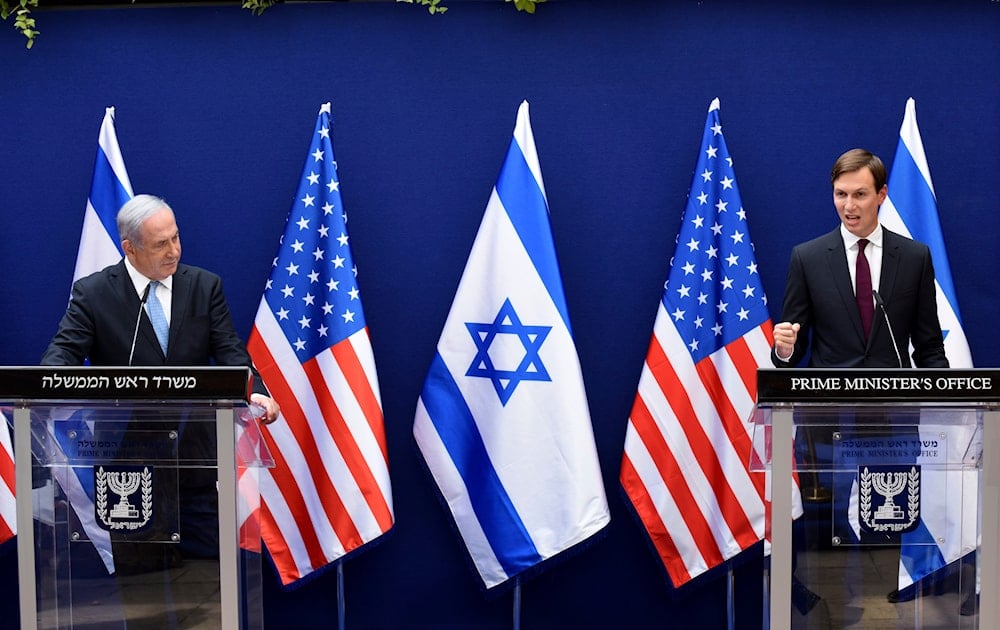Netanyahu, Kushner discuss Gaza deal phase 2, Hamas fighters in tunnel
US envoys meet with Netanyahu as the Gaza ceasefire agreement enters a complex second phase, focusing on Hamas fighters in Rafah tunnels.
-

Israeli Prime Minister Benjamin Netanyahu and White House advisor Jared Kushner make joint statements to the press, in al-Quds, occupied Palestine, Sunday, Aug. 30, 2020 (AP)
US mediators met with Israeli Prime Minister Benjamin Netanyahu as attention shifted to the second and "more complex phase of the Gaza ceasefire agreement," particularly given the presence of a group of Hamas fighters in tunnels in Rafah, according to Reuters.
The Israeli government spokesperson said that "Netanyahu and US envoy Jared Kushner discussed disarming Hamas, removing weapons from Gaza, and ensuring that Hamas does not play a role in governing the territory," all of which are set to be addressed in the next phase of the Gaza ceasefire talks.
A source familiar with the meeting’s details said that it "highlighted the issues of fighters in the tunnels and the expected international stabilization force in Gaza outlined in the Trump plan," according to Reuters. The spokesperson for the Israeli government said that any decisions regarding "Israel’s" policies in Gaza will be made in coordination with the Trump administration.
Safe passage for fighters in tunnels significant test: Witkoff
Last week, US envoy Steve Witkoff described the efforts regarding the fighters in the tunnels, which propose allowing them a safe passage in exchange for surrendering their weapons, as a "test of the next steps toward implementing the ceasefire plan."
Two Western diplomats said that "Israel is skeptical about allowing any safe passage, whether to other parts of Gaza or to Egypt," while a Hamas official confirmed that "talks regarding the safe passages are still ongoing."
He explained that the movement is keen to resolve the "conflict" and eliminate anything that "Israel" could use as a pretext to undermine the ceasefire agreement, but he emphasized that the movement rejects the surrender of its fighters.
A Palestinian source told the agency that "the mediators have intensified their efforts to resolve the crisis because they believe any armed attempt to force the fighters to surrender could jeopardize the entire ceasefire."
Massive Egyptian delegation set for Gaza visit
Egypt is preparing to send a large delegation to the Gaza Strip in the coming days for an extended visit that will include a series of meetings and discussions, aiming to establish a direct and practical Egyptian policy in the territory during the post-war period, according to Arab sources cited by Israeli Channel 15.
The sources, speaking to Baruch Yedid, the Arab affairs editor at the channel, confirmed that "Cairo has decided to have a direct presence and an active, significant role in Gaza to draw lessons from the recent war and ensure long-term stability in the territory."
The visit is expected to include meetings with local forces and Palestinian factions, as well as discussions with Egyptian and regional officials, aiming to develop a roadmap for reconstruction and to organize the security and administrative arrangements in Gaza.
The issue at hand
The presence of Hamas fighters in the Rafah tunnels has become a central challenge in advancing the second phase of the Gaza ceasefire agreement. These fighters are believed to be entrenched deep within a network of fortified tunnels that run beneath southern Gaza, particularly under Rafah, making any negotiation on disarmament or withdrawal highly sensitive.
For Hamas, the fighters in the tunnels represent both a strategic asset and a red line in talks. According to movement officials, surrendering these fighters or forcing them out without guarantees is out of the question, as doing so would severely weaken their position and expose them to targeted attacks by the Israeli occupation forces.
US mediators have reportedly floated proposals involving safe passage for the fighters in exchange for surrendering their weapons. However, "Israel" remains skeptical of such options, viewing any movement of armed personnel, even under negotiated terms, as a potential threat to its military objectives.
Western diplomats warn that any military attempt to storm the tunnels and forcibly extract the fighters could ignite a wider issue, jeopardizing the fragile ceasefire progress made so far. The situation in Rafah, therefore, has become both a tactical and diplomatic deadlock, with the fate of dozens of fighters underground holding up a broader political resolution.

 4 Min Read
4 Min Read








